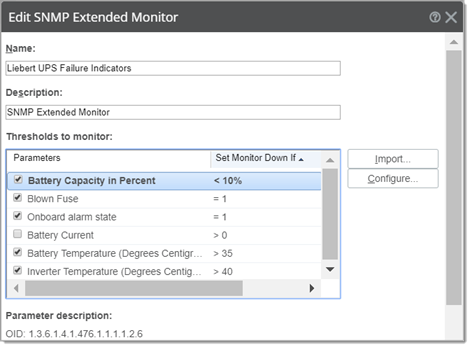SNMP Extended monitor checks one or more OIDs, each against its own threshold, using an XML file you import into the monitor definition. The XML file contains a list of SNMP parameters (OIDs) to monitor. Threshold operators (greater than, less than, equals, contains, and so on) within the monitor's dialog enable you to verify up or down status against expected values. You can customize threshold values as needed based on device-specific characteristics, site service level constraints, and more.
Tip: You can assemble your own XML lists of SNMP OIDs and add them to <install-directory>\Data\SNMPExtended\ on the file system where you installed WhatsUp Gold.
The following figure shows SNMP Extended configuration from Monitors Library.

Provide a unique name and description for the monitor, then configure the following:
Enable monitoring for specific parameters by selecting the respective checkboxes. Click Advanced to set the SNMP timeout and number of retries as well as enable Use in Rescan if desired.
When you add SNMP parameters to an XML file, WhatsUp Gold expects the following format:
Syntax
<SNMPParameter Name="MibObjectName"> <ShortDescription>ObjectValueDescription</ShortDescription> <LongDescription>DetailedObjectValueDescription</LongDescription> <Type>MibObjectValueType</Type> <IndexOID>IntegerInstanceValue</IndexOID> <OID>RequiredObjectId</OID> <DisplayOID>OptionalDisplayTheOID</DisplayOID> <Units>OptionalUnitsAssociatedWithOIDValue</Units></SNMPParameter>
Example
<SNMPParameter Name="IcUpsAlarmUpsOff"> <ShortDescription>Onboard alarm state</ShortDescription> <LongDescription>Indicates the inverter (battery power) and bypass to wall power are both off</LongDescription> <Type>Value</Type> <IndexOID /> <OID>1.3.6.1.4.1.476.1.1.1.1.6.3.12</OID> <DisplayOID /> <Units /></SNMPParameter>